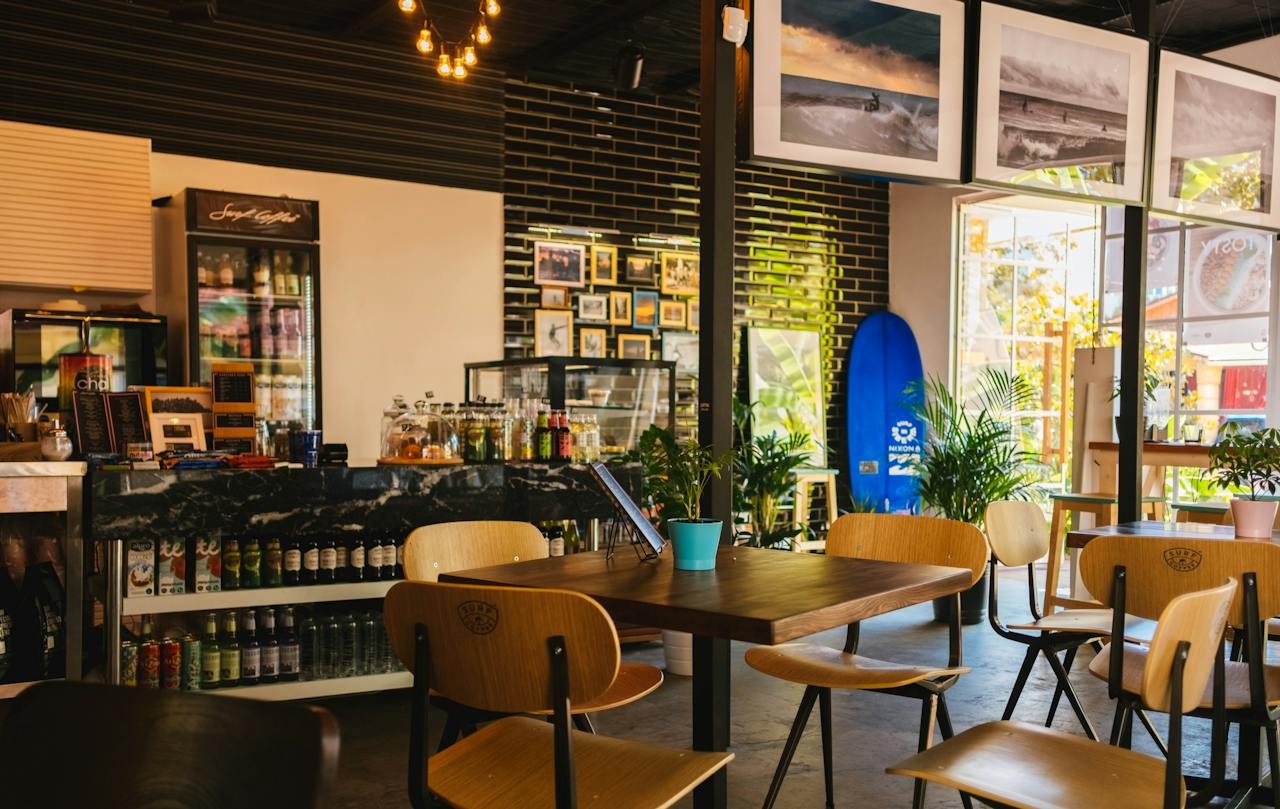Step-by-Step Guide: How to Open a Small Coffee Shop Successfully
By Hamza Benhlima · 23. January 2024
Are you wondering how to transform your coffee obsession into a thriving business?
This comprehensive guide will lead you through the essential steps to launch and start a coffee☕️ shop.
It provides practical advice on everything from budgeting and planning to marketing, helping you turn your dream into a reality.
With this guide, you’ll be able to create a coffee shop that embodies your love for coffee and community.
Essential Takeaways for Starting a Coffee Shop
- Have a passion for coffee? Identify your unique selling point (USP), understand your customer base as well as you know your preferred roast, and meticulously plan your budget to turn your caffeine passion into a thriving business.
- Don’t just improvise, strategize: a well-structured business plan, complete with financial forecasts and a robust marketing strategy, will guide you to industry success.
- Address legal matters before you commence business: acquire the necessary permits, ensure compliance with food safety regulations, and secure comprehensive insurance. Then, establish a strong online presence and build your brand before you hang up the ‘Open’ sign.
Evaluating Your Coffee Shop Idea

Opening your own coffee shop begins with evaluating your coffee shop business idea.
Are you envisioning a bustling city center joint catering to busy office workers, a quiet suburban cafe with a relaxed atmosphere, or a mobile coffee kiosk for events and festivals?
Regardless of your concept, it’s imperative to pinpoint your target market, develop distinctive selling points, and take into account the startup costs as part of your coffee shop business plan.
To start a coffee shop, thorough planning and research are essential.
After all, the coffee shop market is booming, and standing out from the crowd is key to success for an independent coffee shop owner.
Concept Development
Brewing the perfect cup of coffee mirrors the process of developing a unique and engaging coffee shop concept.
Both require thoughtful consideration.
Your concept will shape everything from your decor to your menu, creating a unique customer experience that will set your coffee shop apart from the competition.
So, whether you’re dreaming of an artisan coffee house with an array of single-origin beans or a modern cafe with live music and local art exhibits, make sure your coffee shop ideas have a strong concept to grab your customer’s attention and keep them coming back for more.
Identifying Target Market
Understanding your target market is as vital as knowing the precise temperature for brewing your coffee – both are key to bringing out the best flavors.
Are you catering to the busy office worker in need of a quick caffeine fix, or the relaxed café culture enthusiast wanting to unwind with a latte and a good book?
Understanding your target market will help you choose the right location, set the right prices, and create a marketing plan that hits the mark.
Unique Selling Points
Your Unique Selling Proposition (USP) serves as the secret ingredient fueling your coffee shop’s success.
It’s what makes your shop stand out from the crowd.
Here are some examples of USPs that can set your coffee shop apart:
- Specialty coffee sourced from small independent farmers
- Baristas who provide service that goes the extra mile
- Unique and innovative coffee brewing methods
- A cozy and inviting atmosphere
- A focus on sustainability and eco-friendly practices
Whatever your USP may be, it should be at the heart of your existing business model, attracting customers and setting you apart from your competitors.
Budgeting for Success

Having developed an exceptional concept, the next step is to engage with the numbers.
Opening a small coffee shop requires a significant investment, from securing the perfect location and purchasing top-notch equipment to hiring skilled baristas.
But don’t let the costs scare you!
With careful planning and smart decisions, you can manage your startup costs and set your coffee shop up for financial success.
Location Selection
Just as selecting the perfect beans is vital, so is choosing the ideal location for your coffee shop.
The location will determine the amount of foot traffic, accessibility for your target customers, and the level of competition you’ll face.
So, whether it’s a bustling city center spot or a quiet suburban enclave, the right location is key to the success of your coffee shop, as well as the success of surrounding successful coffee shops.
Equipment Purchasing
The subsequent task involves acquiring the necessary equipment.
From espresso machines and coffee grinders to refrigerators and blenders, you’ll need to invest in top-quality equipment to ensure your coffee shop runs smoothly.
But don’t let the hefty price tags scare you.
Buying second-hand or leasing equipment can be a cost-effective way to get your cafe up and running without breaking the bank.
Staffing Solutions
Concluding the budgeting considerations, but certainly not the least important, is your team.
Your baristas are the face of your coffee shop, and investing in their training and development can pay off in spades.
From brewing the perfect espresso to providing top-notch customer service, your team plays a crucial role in your coffee shop’s success.
Crafting Your Business Plan

Having honed your concept, established your budget, and readied your espresso machine, it’s now time to formulate your business plan.
This document is your roadmap to success, outlining:
- your business model
- financial projections
- marketing strategies
- growth opportunities
It’s the key to securing funding, attracting partners, and guiding your coffee shop to success.
Financial Projections
The business plan heavily relies on your financial projections.
They provide a snapshot of your coffee shop’s financial health, predicting future revenues and expenses.
They’re crucial for securing funding and making informed decisions about your business’s growth and development.
Marketing Strategies
Following the financial projections, we consider the marketing strategies.
How will you attract customers to your coffee shop? Some marketing strategies to consider include:
- Social media campaigns
- Loyalty programs
- Local advertising
- Partnerships with other businesses
- Hosting events or workshops
- Offering promotions or discounts
Your marketing strategies should be tailored to your target market, promoting your offerings and building a loyal customer base.
Growth Opportunities
It’s also important to recognize growth opportunities.
Whether it’s opening additional locations, expanding your menu, or offering catering services, identifying growth opportunities can help increase revenue and ensure your coffee shop’s long-term success.
Legal Considerations and Compliance

Prior to opening your doors, you must familiarize yourself with the legal framework.
This includes obtaining the necessary permits and licenses, adhering to food safety regulations, and securing the right insurance coverage.
While it may seem daunting, these steps are crucial for protecting your business and ensuring your coffee shop operates legally and safely.
Permits and Licenses
Initiating a coffee shop calls for several permits and licenses, ranging from business licenses to food service permits.
The requirements vary depending on your location and business structure, so it’s important to do your research and ensure you have all the necessary paperwork in place before you start trading.
Food Safety Regulations
Being a food business, your coffee shop is required to strictly follow food safety regulations.
This ensures the health and safety of your customers and staff, and compliance is mandatory for all foodservice businesses.
So, from handling and storing your coffee beans to preparing and serving food, make sure you’re up to speed with the latest food safety regulations.
Insurance Coverage
Insurance is another critical aspect that shouldn’t be overlooked.
From property damage to employee injuries and customer lawsuits, the right insurance coverage can protect your coffee shop from potential liabilities.
So, whether it’s general liability insurance or workers’ compensation, make sure you’re adequately covered.
Building Your Brand and Online Presence

Having addressed all the legal requirements, the focus now shifts to constructing your brand and establishing an online presence.
Your brand is the heart and soul of your coffee shop, representing your values, personality, and what sets you apart from the competition.
And in today’s digital world, a strong online presence is key to attracting customers and growing your business.
Brand Identity
Brand identity transcends beyond merely your logo or color scheme. It’s the essence of your coffee shop, reflecting your mission, values, and the unique experiences you offer.
A strong brand identity can help you attract your target audience, build customer loyalty, and differentiate your coffee shop from competitors.
Social Media Strategy
In the contemporary digital era, maintaining a robust social media presence is imperative for any coffee shop.
From Instagram posts showcasing your delicious drinks and food to Facebook updates about upcoming events, an effective social media strategy can help you engage with your target audience, promote your offerings, and build a loyal customer base.
Website Design
Concluding the digital considerations, but certainly not the least significant, is your website.
Your website is your virtual storefront, providing potential customers with essential information about your coffee shop.
From your menu and location to your opening hours and contact information, an attractive and user-friendly website can help attract customers and boost your online presence.
Launching Your Small Coffee Shop
Having built a strong brand and thriving online presence, the stage is now set to launch your coffee shop.
This is where all your hard work pays off, as you open your doors to the public and start serving up your delicious coffee.
But to ensure a successful launch🚀, you’ll need to plan a grand opening event, offer promotions and partnerships, and engage with your local community.
Grand Opening Event
The grand opening event presents an opportunity to create a buzz in the local community.
Whether it’s a ribbon-cutting ceremony, a special promotion, or a live music event, your grand opening should be a celebration that attracts customers and generates excitement about your new coffee shop.
To make the event more memorable, consider serving your delicious coffee in printed coffee shop packaging with logo that feature your coffee shop’s logo.
This not only adds a personal touch but also serves as a great marketing tool, promoting your brand with every sip taken.
Promotions and Partnerships
Initiating promotions and forging partnerships can contribute to enhanced foot traffic and amplified sales.
From offering opening week discounts to partnering with local businesses for cross-promotions, these strategies can help attract customers and build buzz around your new coffee shop.
Community Engagement
Lastly, the importance of community engagement should not be underestimated.
From hosting local events to participating in community projects, engaging with your local community can help build a positive reputation for your coffee shop, foster customer loyalty, and encourage word-of-mouth marketing.
Summary
Opening a coffee shop is a journey filled with exciting challenges and rewarding successes.
From developing a unique concept and crafting a comprehensive business plan to navigating legal requirements and building a strong brand, every step is crucial to your coffee shop’s success.
With careful planning, strategic decision-making, and a passion for coffee, you can transform your dream of owning a coffee shop into a thriving reality.
So, what are you waiting for? It’s time to start brewing up your coffee shop success story!
Frequently Asked Questions
How profitable is a small coffee shop?
While starting a small coffee shop may not be immediately lucrative, with the average profit margins being modest, it can be a fulfilling venture with careful planning and management.
It’s important to keep your expectations realistic and focus on efficient operations to increase profitability.
How important is the location of a coffee shop?
The location of a coffee shop is crucial for its success as it impacts foot traffic, accessibility for the target market, and the level of competition.
What are some of the key components of a coffee shop’s business plan?
Your coffee shop’s business plan should cover financial projections, marketing strategies, and potential growth opportunities to set a solid foundation for success.
What legal requirements must a coffee shop meet?
Make sure your coffee shop has the required permits, complies with food safety regulations, and has the right insurance coverage to stay legal and safe.

